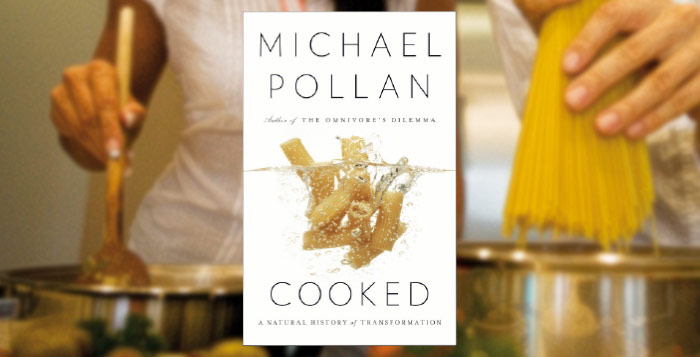The first book by Michael Pollan I read was called Food Rules, and can be summarised in seven words: Eat Food. Not too much. Mostly Plants.
His latest book Cooked is a banquet of ideas, with lavish digressions and an amazing cast of real-life characters, which explores how people cook with fire, water, air and earth.
“People call things cooking today that would roll their grandmother in her grave,” food industry market researcher Harry Balzer tells Pollan. “Like heating up a can of food or microwaving a frozen pizza.”
And this idea is why local shop owners find themselves in the food business.
Balzer goes on to say: “One hundred years ago chicken for dinner meant going out and catching, killing, plucking and gutting a chicken. Do you know anyone who still does that? It would be considered crazy!
“Well, that’s exactly how cooking will seem to your grandchildren. Like sewing or darning socks – something people used to do when they had no other choice. Get over it!”
Balzer’s company now defines making a sandwich as cooking and washing a head of lettuce and pouring dressing on it as cooking. But not microwaving a pizza. Today, Americans spend 27 minutes a day on food preparation and another four minutes cleaning up.
And this is why local shop owners find themselves in the food business.
Pollan is on a crusade. He observes Americans have abandoned the kitchen, “handing the preparation of most of our meals to the food industry”, yet spend so much of their time watching people cook it on television.
“First we cooked our food and then our food cooked us,” he writes. “Corporations cook very differently from how people do. Industrial cooking has taken a toll on our health and wellbeing.”
Pollan uses this starting point to show how people now cook because they want to. “My wager in Cooked is that the best way to recover the reality of food is by attempting to master the physical processes by which it has traditionally been made.”
Reading Cooked will help both types of retailers: the ones who want to know what type of processed foods to offer and the ones who want to provide shoppers with the ingredients they need to cook from scratch. Understanding how cooking works is to understand how people work.
In the chapter on fire, Pollan meets famous chef Ed Mitchell. How did he get started? His parents ran a corner shop in Wilson, North Carolina, and after his father died, Ed drove his mother to the shop daily. Business was bad. One day she made $19, mainly from food stamps. To cheer her up he said he’d do a barbecue lunch the next day.
“While we were enjoying our barbecue someone came into the grocery store wanting some hot dogs. But when the man saw the pail of barbecue he said, ‘Mrs Mitchell, y’all got barbecue too?’ She made the man a couple of sandwiches and he left.
“When I came back that evening to escort her home Mama was all bubbly. ‘I made some money today,’ she said. ‘I sold all that barbecue.’
“As we were locking up that night a stranger came to the front door [to ask if we had more barbecue]. ‘We don’t have no more today but we’ll have some tomorrow.’ And that’s how Ed got into the barbecue business.”
The money can be out there. Cooked may help you find it and you may find yourself in the food business.





Comments
This article doesn't have any comments yet, be the first!